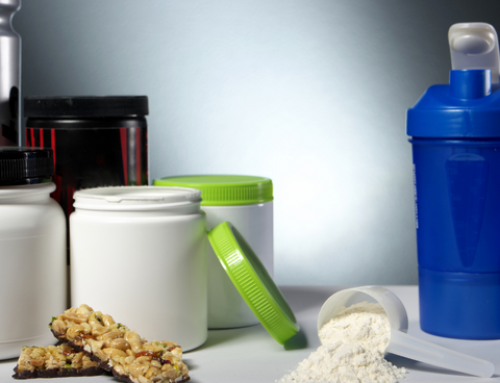HEALTH ALERT: Third-Party Testing Finds Heavy Metals in Many Popular Supplements
The supplement market is sketchy. It’s hard to differentiate between a quality product and one that contains cheap fillers or even dangerous ingredients.
There are some warning signs that a supplement is junk. The most obvious is the “proprietary blend” label, which some companies misuse to hide what they’re actually putting into a supplement.
Even if a product is from a reputable company, you still can’t be 100 percent sure that the product is what it’s cracked up to be.
That’s why LabDoor, a supplement testing and review company, independently tests popular supplements to verify each product’s performance and safety, so you can make an informed choice about the supplements you put into your body.
RELATED: 4 Muscle-Building Supplements That Don’t Work
“LabDoor is a platform to find, research and purchase supplements,” says Dan Mark, research director at LabDoor. “We buy the products the same way a consumer would off of the shelf off different retailers and then we get those products in a lab to test them.”
Based on the test results and latest research on ingredients, Labdoor grades the supplements in several different categories, including:
Label Accuracy. LabDoor tests the included ingredients to make sure the amount of advertised calories, fat, protein, carbs and other ingredients are accurately represented.
Product Purity. Supplements are tested for lead and other heavy metals, which are dangerous to health.
Nutritional Value. This is a grade of the overall nutritional content in the product.
Ingredient Safety. LabDoor tests to see if the ingredient levels are safe and checks the research on every ingredient to identify potential adverse side effects.
Projected Efficacy. Finally, they grade the supplement on whether the ingredients actually work as advertised and can be put to use by the body.
Unfortunately, not all supplements receive passing grades. For example, BSN True-Mass Protein received an F grade and placed 82nd out of 82 protein products tested. Its label is slightly inaccurate, but it takes its biggest hit on the Nutritional Value score. Only 24 percent of the calories in the product come from protein, which is far below the industry average of 67 percent. It also contains high levels of sodium, cholesterol and fat.
In other products, there’s evidence of protein spiking. This means that companies are adding ingredients to trick the lab tests into detecting more protein than is actually in the product.
“One of the biggest findings we’ve found is protein spiking,” says Mark. “What companies can do is put in filler amino acids that contain nitrogen and can fool the test. We take it a step further and run a high performance liquid chromatography, and that will separate the individual amino acids so we can tell if a company is spiking their protein.”
This advanced test ensures that you, the consumer, are actually paying for what was advertised.
LabDoor has tested hundreds of products in multiple categories, including protein, creatine, BCAAs, pre-workouts, fish oils and several others.
Recently, they put protein bars to the test, and the results were interesting to say the least.
Overall, the products tested well and there was no evidence of protein spiking.
MusclePharm’s protein bar had 6 grams of unclaimed saturated fats and came in at 306 versus 210 calories. For those of you who carefully watch your calories, this rather large difference could screw up your total daily caloric intake.
Alarmingly, several of the products tested positive for heavy metals.
PowerBar 20g, Vega Sport, Simply Protein and Pure exceed California’s legal limit for daily lead intake in a single serving. Vega Sport also contained cadmium and mercury.
The health dangers from heavy metals include things like weakness, bone damage, high blood pressure, kidney damage and brain damage, just to name a few. Your goal should be to avoid heavy metals at all costs, and it’s inexcusable for a product to contain them.
So what should you do? A simple solution is to visit LabDoor’s website when purchasing a supplement. There, you can determine the best quality supplement for your budget and choose a product that you know is safe and will actually work.
Unfortunately, LabDoor hasn’t tested every product. But with continued support, their database will continue to grow.
RELATED: 4 Creatine Myths Exposed
RECOMMENDED FOR YOU
MOST POPULAR
HEALTH ALERT: Third-Party Testing Finds Heavy Metals in Many Popular Supplements
The supplement market is sketchy. It’s hard to differentiate between a quality product and one that contains cheap fillers or even dangerous ingredients.
There are some warning signs that a supplement is junk. The most obvious is the “proprietary blend” label, which some companies misuse to hide what they’re actually putting into a supplement.
Even if a product is from a reputable company, you still can’t be 100 percent sure that the product is what it’s cracked up to be.
That’s why LabDoor, a supplement testing and review company, independently tests popular supplements to verify each product’s performance and safety, so you can make an informed choice about the supplements you put into your body.
RELATED: 4 Muscle-Building Supplements That Don’t Work
“LabDoor is a platform to find, research and purchase supplements,” says Dan Mark, research director at LabDoor. “We buy the products the same way a consumer would off of the shelf off different retailers and then we get those products in a lab to test them.”
Based on the test results and latest research on ingredients, Labdoor grades the supplements in several different categories, including:
Label Accuracy. LabDoor tests the included ingredients to make sure the amount of advertised calories, fat, protein, carbs and other ingredients are accurately represented.
Product Purity. Supplements are tested for lead and other heavy metals, which are dangerous to health.
Nutritional Value. This is a grade of the overall nutritional content in the product.
Ingredient Safety. LabDoor tests to see if the ingredient levels are safe and checks the research on every ingredient to identify potential adverse side effects.
Projected Efficacy. Finally, they grade the supplement on whether the ingredients actually work as advertised and can be put to use by the body.
Unfortunately, not all supplements receive passing grades. For example, BSN True-Mass Protein received an F grade and placed 82nd out of 82 protein products tested. Its label is slightly inaccurate, but it takes its biggest hit on the Nutritional Value score. Only 24 percent of the calories in the product come from protein, which is far below the industry average of 67 percent. It also contains high levels of sodium, cholesterol and fat.
In other products, there’s evidence of protein spiking. This means that companies are adding ingredients to trick the lab tests into detecting more protein than is actually in the product.
“One of the biggest findings we’ve found is protein spiking,” says Mark. “What companies can do is put in filler amino acids that contain nitrogen and can fool the test. We take it a step further and run a high performance liquid chromatography, and that will separate the individual amino acids so we can tell if a company is spiking their protein.”
This advanced test ensures that you, the consumer, are actually paying for what was advertised.
LabDoor has tested hundreds of products in multiple categories, including protein, creatine, BCAAs, pre-workouts, fish oils and several others.
Recently, they put protein bars to the test, and the results were interesting to say the least.
Overall, the products tested well and there was no evidence of protein spiking.
MusclePharm’s protein bar had 6 grams of unclaimed saturated fats and came in at 306 versus 210 calories. For those of you who carefully watch your calories, this rather large difference could screw up your total daily caloric intake.
Alarmingly, several of the products tested positive for heavy metals.
PowerBar 20g, Vega Sport, Simply Protein and Pure exceed California’s legal limit for daily lead intake in a single serving. Vega Sport also contained cadmium and mercury.
The health dangers from heavy metals include things like weakness, bone damage, high blood pressure, kidney damage and brain damage, just to name a few. Your goal should be to avoid heavy metals at all costs, and it’s inexcusable for a product to contain them.
So what should you do? A simple solution is to visit LabDoor’s website when purchasing a supplement. There, you can determine the best quality supplement for your budget and choose a product that you know is safe and will actually work.
Unfortunately, LabDoor hasn’t tested every product. But with continued support, their database will continue to grow.
RELATED: 4 Creatine Myths Exposed












